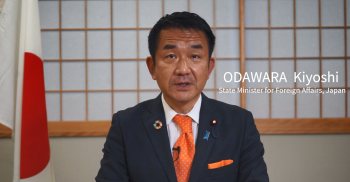Nuclear Disarmament and Non-Proliferation
The 28th Asian Export Control Seminar
The 28th Asian Export Control Seminar was held online from February 15 to 17, 2022. The Seminar was organized by the Center for Information on Security Trade Control (CISTEC) and co-hosted by the Ministry of Foreign Affairs and the Ministry of Economy, Trade and Industry. It drew approximately 400 participants from 32 countries and regions as well as international organizations, etc.
1 Background
Asian countries and regions face a growing risk of illegal procurement activities by countries and regions of concern. With their economic growth, they have become centers for manufacturing and trade for items and technologies that can be diverted to develop weapons of mass destruction. This seminar was held to promote regional and international non-proliferation efforts by raising awareness and building confidence among competent authorities in Asian countries and regions for export controls to enhance their capacity.
2 Outline
(1) Opening Remarks
At the outset of the Seminar, State Minister for Foreign Affairs of Japan ODAWARA Kiyoshi emphasized the importance of export controls to address international non-proliferation efforts and called for the full implementation of the United Nations Security Council Resolutions related to North Korea. He hoped that this Seminar would strengthen export controls and avoid creating loopholes. He referred to the United Nations Security Council Resolution 1540 to prevent proliferation to non-State actors (terrorists, etc.) and the Hague Code of Conduct against Ballistic Missile Proliferation (HCOC, established 20 years ago). (PDF) 
(2) Strengthening Export Controls in Asia
A panel discussion was held in two parts. In the first part, government officials from Japan, Malaysia, and the United States discussed “Ensuring the effectiveness of export control systems (Strengthening the control of intangible technology transfer).” In the second part, government officials from Japan, the Philippines, Germany, India, and the United Kingdom discussed "Enhancing the Effectiveness of Industrial Export Controls (Strengthening Cooperation and Collaboration with Industry).” Each panel discussed new legislation and initiatives against intangible technology transfers, catch-all controls, outreaches to industry and academia, and the importance of strengthening export controls in Asia (which have an increasingly crucial role in the international supply chain). Government officials from Cambodia, China, the Philippines, Hong Kong, India, Korea, Laos, Malaysia, Mongolia, and Pakistan also reported updates on their export control systems.
(3) Countries Responding to Recent Developments
Government officials from Canada, the European Union, France, Russia, Switzerland, the United Arab Emirates, the United Kingdom, and the United States gave presentations on the current status, areas of focus, and challenges of their export control, accounting recent developments and emerging technologies.
(4) International Framework Activities
Experts from the United Nations Security Council Committee established pursuant to Resolution 1718, the 1540 Committee Group of Experts, and the United Nations Department of Political and Peacebuilding Affairs gave presentations on developments surrounding relevant Security Council Resolutions and called on participating countries to implement those resolutions. Representatives from the International Export Control Regimes (the Nuclear Suppliers Group [NSG], the Australia Group [AG], the Missile Technology Control Regime [MTCR], and the Wassenaar Arrangement [WA]), the Organisation for the Prohibition of Chemical Weapons (OPCW), the Hague Code of Conduct against Ballistic Missile Proliferation (HCOC), and the European External Action Service (EEAS) also reported their recent activities.
3 Participating Countries and Regions
(1) Asia (19 countries/regions)
Japan, Bangladesh, Cambodia, China, India, Indonesia, South Korea, Laos, Malaysia, Mongolia, Myanmar, Pakistan, Philippines, Singapore, Sri Lanka, Thailand, Vietnam, Hong Kong, and Taiwan
(2) Outside Asia (13 countries/regions)
Australia, Canada, the European Union, France, Germany, Italy, Netherlands, Russia, Switzerland, Ukraine, United Arab Emirates, the United Kingdom, and the United States


